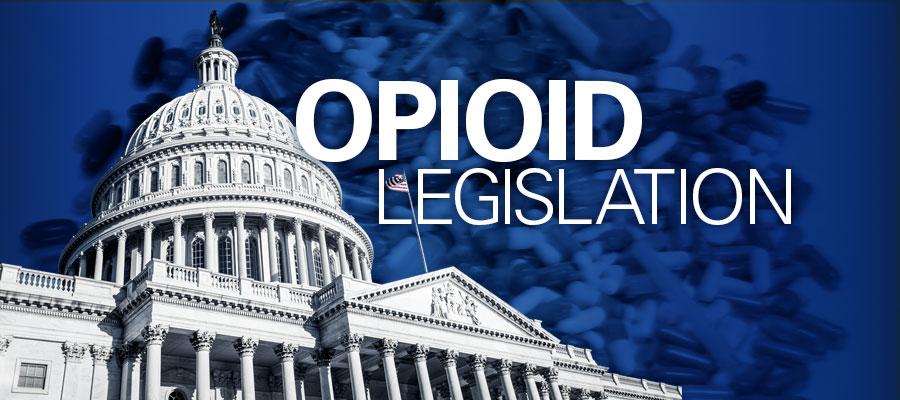House Committees Advance Opioid Bills

The House Energy and Commerce Committee yesterday approved 32 bills to address the opioid crisis, including 12 AHA-supported bills:
- H.R. 1925 would require state Medicaid programs to automatically restore medical assistance eligibility to juveniles after release from incarceration.
- H.R. 3192 would require state Children’s Health Insurance Programs to cover mental health benefits.
- H.R. 4998, as amended, would allow former foster youth to maintain Medicaid coverage until age 26 if they move to a different state.
- H.R. 5590 would require the Department of Health and Human Services to establish an action plan, including studies, reports to Congress, and meetings with stakeholders, to address the opioid crisis.
- H.R. 5603 would instruct the Centers for Medicare & Medicaid Services to remove geographic barriers to telehealth services provided to treat substance use disorder or a co-occurring mental health disorder that is co-occurring with a substance use disorder
- H.R. 5716 would require CMS to establish thresholds for overprescribers, based on specialty and geographic area, identify them, and notify them of their status.
- H.R. 5789 would provide for Medicaid coverage protections for pregnant and postpartum women while receiving inpatient treatment for substance use disorder.
- H.R. 5795 would align 42 CFR Part 2 regulations on confidentiality of substance use disorder treatment records with the Health Insurance Portability and Accountability Act privacy rule.
- H.R. 5796 would direct CMS to contact identified overprescribers and share best practices to evaluate prescribing behavior.
- H.R. 5797, as amended, would allow states to receive federal matching funds for up to 30 days per year of services provided to adult Medicaid beneficiaries with an opioid use disorder in an Institution for Mental Disease (IMD).
- H.R. 5798 would add to the initial Welcome to Medicare physical examination a review of the beneficiary’s current opioid prescriptions and screening for opioid use disorder when appropriate.
- H.R. 5801 would establish requirements for the integration of prescription drug monitoring program (PDMP) usage into Medicare providers’ clinical workflow.
Earlier this week, the House Ways and Means Committee approved seven opioid-related bills:
- H.R. 5676 would suspend payments to pharmacies by Medicare prescription drug plans and Medicare Advantage plans pending investigations of credible allegations of fraud by pharmacies.
- H.R. 5723 would require the Medicare Payment Advisory Commission to report to Congress on how the program pays for pain management treatments in inpatient and outpatient hospital settings and identify incentives for prescribing non-opioid treatments.
- H.R. 5773 would standardize electronic prior authorization for prescription drugs under Medicare Part D and require prescription drug plan sponsors to establish drug management programs for at-risk beneficiaries.
- H.R. 5774 would require the HHS Secretary to develop guidance on pain management and opioid use disorder prevention strategies for beneficiaries under Medicare Part A, and establish technical expert panels to review quality measures relating to opioids and opioid use disorders, among other provisions.
- H.R. 5775 would require Medicare prescription drug plans to provide certain enrollees with information on the adverse effects of opioid overuse, coverage of alternative pain medications and safe disposal of controlled substances; revise Hospital Consumer Assessment of Healthcare Providers and Systems Survey measures relating to pain management; and restrict the use of HCAHPS pain questions in the Hospital Value-Based Purchasing Program.
- H.R. 5776 would require the HHS Secretary to review the Medicare outpatient prospective payment system to ensure there are not financial incentives to use opioids rather than non-opioid alternatives, among other provisions.
- H.R. 5788 includes provisions intended to curb international shipments of illicit synthetic opioids.
Related News Articles
Perspective
Abraham Lincoln, among those whose legacy we honor with Presidents Day next week, might have put it this way: Thirteen score and three days from now… …
Headline
The Senate Special Committee on Aging held a hearing Feb. 11 on issues impacting physician burnout. The AHA provided a statement for the hearing and urged…
Headline
The House Energy and Commerce Subcommittee on Health Feb. 11 hosted a hearing titled “Lowering Health Care Costs for All Americans: An Examination of the…
Headline
Capitol Hill was the focus of the second morning of the AHA 2026 Rural Health Care Leadership Conference, taking place through tomorrow in…
Headline
The AHA Feb. 10 released its 2026 Rural Advocacy Agenda, laying out the association's key priorities for Congress, the administration, regulatory agencies and…
Headline
The Assistant Secretary for Technology Policy/Office of the National Coordinator for Health Information Technology announced the selection of nine pilots as…

